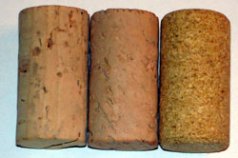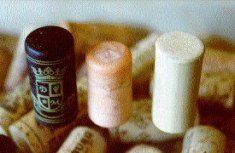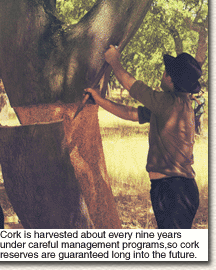Real Cork or Synthetic?
This is a bit of an issue for the home winemaker. Most of the corks you can purchase at the supply store are made up of tiny bits of cork all pressed together (called agglomerated). The same way chicken scraps are pressed together to make chicken nuggets. These are the bottom of the barrel as corks go. Wineries that still use corks only use the corks made from a single piece of the cork oak bark, not pressed bits. You can get the agglomerated corks for about 20¢ a piece. The winery quality corks are more like 75¢ each. I have personally found that agglomerated are more prone to leakage and tainting of the wine.
Did you know that the wine industry has about 5% loss of wine due to cork spoilage. That means one in twenty bottles. Imagine that one out of twenty cans of soda was no good when you opened it. Those kinds of losses are just not acceptable. Cork spoilage or cork taint is caused by a fungus found in cork. Now you know why so many of the wineries have switched to either synthetic corks or screw tops. Don’t laugh, it’s the high end wines that are making the switch to metal screw tops, corks are on their way out.
I’ve been buying synthetic corks for some time now. They cost about 20¢ each in bulk (in lots of 1000) and they have some added advantages. First, they don’t have a problem with cork spoilage. I love that I don’t have to lay bottles down or invert them. Synthetic corks don’t have to stay wet, they are just as happy sitting right-side up. They can also be stored for a very long time before use, there is no issue with the humidity level of synthetic corks. You don’t have to soak them or sulfite them, just grab a cork and seal the bottle.
There is one down side to synthetics, in particular to the home winemaker. If you have one of those hand corkers, you are not going to enjoy trying to insert them into your bottles. You can’t create enough pressure by hand to squeeze the cork down while inserting it in the bottle. You need a floor corker.
There are a few name brands out there; Nomacork, Neocork, Supreme Corq. I’ve been very happy with synthetic corks, I have absolutely no reason to look back.
If you are curious, the process of making corks is rather fascinating. Do a Google search for “harvesting cork.”




Jeff said,
September 2, 2008 at 12:06 pm
Natural cork leads to corked wine and I think the percentage of spoiled wines is a lot higher than you are claiming here probably closer to one in tne bottles.
The synthetic corks can let the wine oxidise.
The best bet is the new kid on the block that most are now trialing is the screw cap.
Great blog btw.
maurizio said,
October 28, 2008 at 8:56 am
®
SEDE LEGALE:
Via Labiena n°153
21014 Laveno Mombello (VA)
UFFICI:
Via Vittorio Veneto, 5 – 21030 Rancio Valcuvia (va)
TEL. 0332-994150 FAX 0332-994456
P.IVA 02819040128
Rancio Valcuvia, 27/10/08
Dear Sirs,
SUBJECT: SALE OF EQUIPMENT FOR PRODUCTION OF SYNTHETIC EXTRUDED CORK FOR BOTTLE OF WINE
We inform you that, because our company is changing activity, we are selling the following equipment:
– HEAD AND EQUIPMENT FOR THE PRODUCTION OF SYNTHETIC EXTRUDED CORK.
– NR. 1 LINE OF AUTOMATIC PRINTING OF 1 COLOR ON CORKS DIAM. 22X38, 22X41, 26X38, 28X44, 28X47 MM. SEBS OR polythene EVA LAYOUT 02/1234 NUMBER 5676
We send you also photo of this equipment.
For any information you will need about it, please contact Mr. Maurizio Scamarda cell. 3292313206 or our office.
Best regards.
Claude said,
February 15, 2013 at 6:43 am
Dear Mauricio
Have you sell your equipment?
Regards
Claude